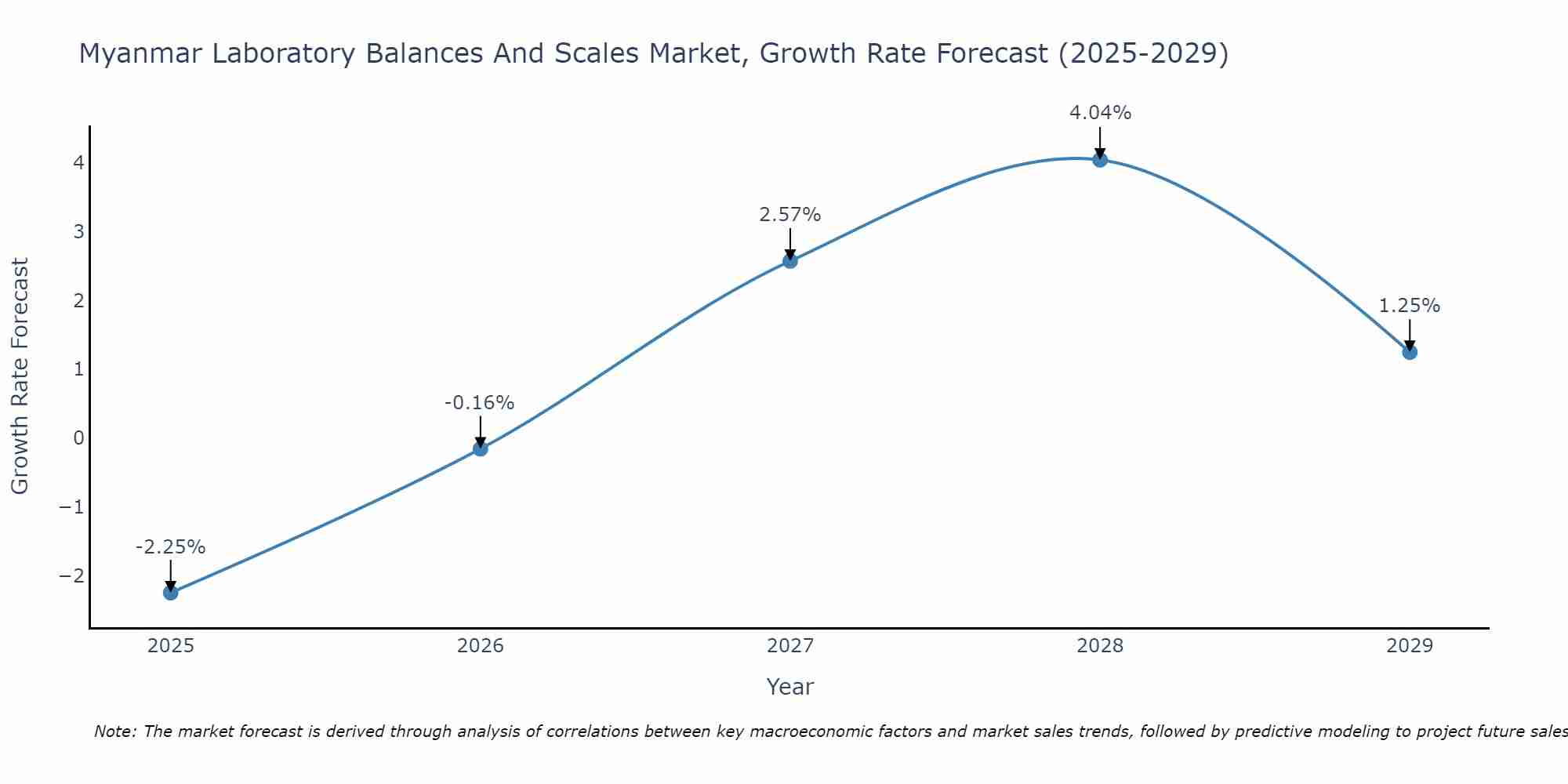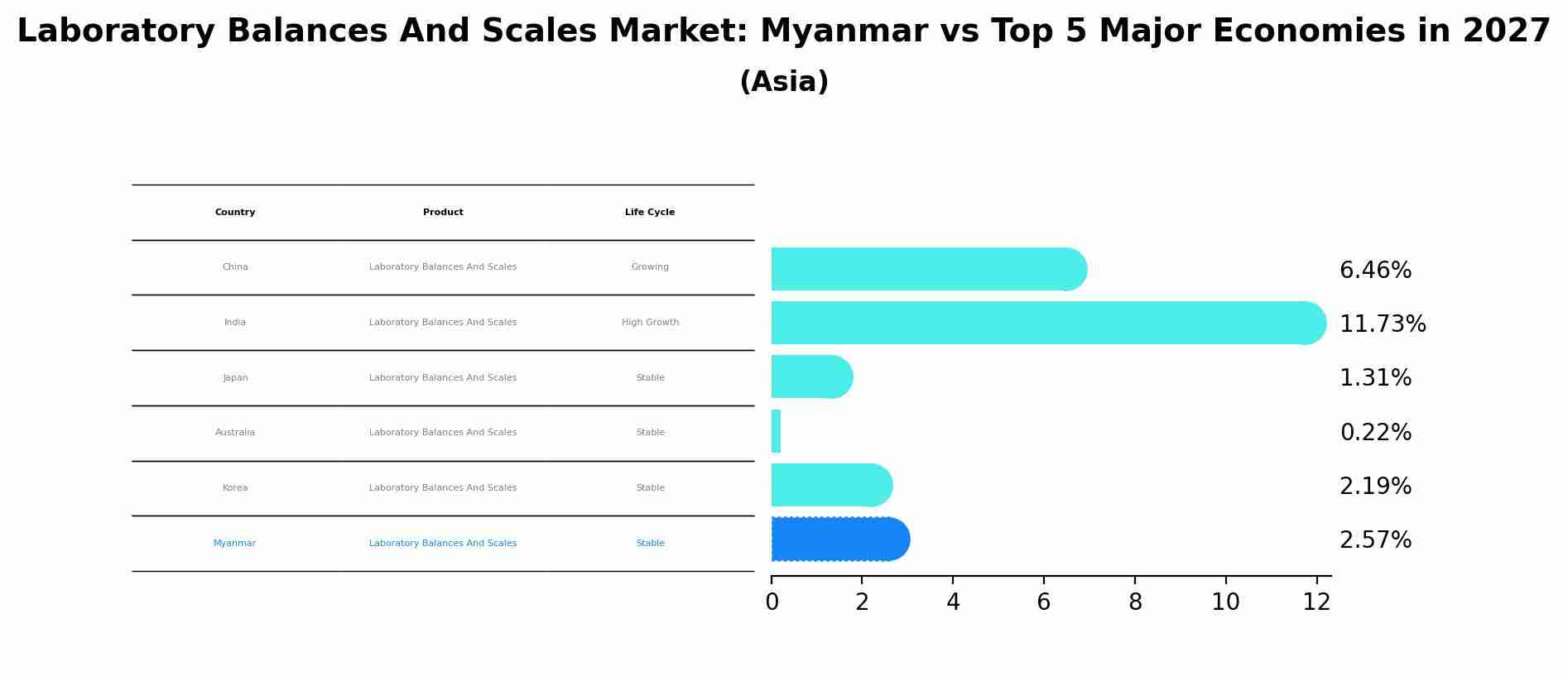Myanmar Laboratory Balances And Scales Market (2025-2031) Outlook | Forecast, Size, Analysis, Value, Industry, Growth, Companies, Revenue, Trends & Share
| Product Code: ETC365734 | Publication Date: Aug 2022 | Updated Date: Aug 2025 | Product Type: Market Research Report | |
| Publisher: 6Wresearch | Author: Shubham Padhi | No. of Pages: 75 | No. of Figures: 35 | No. of Tables: 20 |
Myanmar Laboratory Balances And Scales Market Size Growth Rate
The Myanmar Laboratory Balances And Scales Market is projected to witness mixed growth rate patterns during 2025 to 2029. The growth rate begins at -2.25% in 2025, climbs to a high of 4.04% in 2028, and moderates to 1.25% by 2029.

Laboratory Balances And Scales Market: Myanmar vs Top 5 Major Economies in 2027 (Asia)
By 2027, the Laboratory Balances And Scales market in Myanmar is anticipated to reach a growth rate of 2.57%, as part of an increasingly competitive Asia region, where China remains at the forefront, supported by India, Japan, Australia and South Korea, driving innovations and market adoption across sectors.

Myanmar Laboratory Balances And Scales Market Overview
Myanmar laboratory balances and scales market is expanding with the growth of research and development activities in various sectors, including pharmaceuticals, biotechnology, and academia. High-precision balances and scales are essential for accurate measurements in laboratory experiments and industrial applications, driving market demand.
Drivers of the market
The expansion of research and development activities across various industries, including pharmaceuticals, biotechnology, and academia, drives the demand for laboratory balances and scales in Myanmar. Laboratory balances and scales play a critical role in precise measurement and weighing applications, ensuring accuracy and reproducibility in experimental procedures and quality control processes. Moreover, the increasing emphasis on product quality, safety, and regulatory compliance fuels the adoption of advanced laboratory weighing instruments with features such as automated calibration, data logging, and compliance with international standards. Additionally, the integration of laboratory balances and scales with laboratory information management systems (LIMS) enhances data integrity and workflow efficiency in laboratories, further stimulating market growth in Myanmar.
Challenges of the market
Challenges in the laboratory balances and scales market in Myanmar include limited adoption of advanced weighing technologies, concerns over calibration and accuracy standards, and competition from low-cost imported products. Moreover, a lack of standardized regulations and certification processes impact market credibility.
Government Policy of the market
The government has established policies to support the laboratory balances and scales market, emphasizing accuracy and reliability in scientific measurements. These policies include regulations to ensure the precision and calibration of laboratory equipment, incentives for local manufacturing and importation of high-quality balances and scales, and measures to promote training and certification programs for laboratory technicians.
Key Highlights of the Report:
- Myanmar Laboratory Balances And Scales Market Outlook
- Market Size of Myanmar Laboratory Balances And Scales Market, 2024
- Forecast of Myanmar Laboratory Balances And Scales Market, 2031
- Historical Data and Forecast of Myanmar Laboratory Balances And Scales Revenues & Volume for the Period 2021-2031
- Myanmar Laboratory Balances And Scales Market Trend Evolution
- Myanmar Laboratory Balances And Scales Market Drivers and Challenges
- Myanmar Laboratory Balances And Scales Price Trends
- Myanmar Laboratory Balances And Scales Porter's Five Forces
- Myanmar Laboratory Balances And Scales Industry Life Cycle
- Historical Data and Forecast of Myanmar Laboratory Balances And Scales Market Revenues & Volume By Type for the Period 2021-2031
- Historical Data and Forecast of Myanmar Laboratory Balances And Scales Market Revenues & Volume By Laboratory Balances for the Period 2021-2031
- Historical Data and Forecast of Myanmar Laboratory Balances And Scales Market Revenues & Volume By Laboratory Scales for the Period 2021-2031
- Historical Data and Forecast of Myanmar Laboratory Balances And Scales Market Revenues & Volume By End-User for the Period 2021-2031
- Historical Data and Forecast of Myanmar Laboratory Balances And Scales Market Revenues & Volume By Pharmaceutical and Biotechnology Products Testing Laboratories for the Period 2021-2031
- Historical Data and Forecast of Myanmar Laboratory Balances And Scales Market Revenues & Volume By Cosmeceutical Products Laboratories for the Period 2021-2031
- Historical Data and Forecast of Myanmar Laboratory Balances And Scales Market Revenues & Volume By Academic Institutes for the Period 2021-2031
- Historical Data and Forecast of Myanmar Laboratory Balances And Scales Market Revenues & Volume By Research Laboratories for the Period 2021-2031
- Myanmar Laboratory Balances And Scales Import Export Trade Statistics
- Market Opportunity Assessment By Type
- Market Opportunity Assessment By End-User
- Myanmar Laboratory Balances And Scales Top Companies Market Share
- Myanmar Laboratory Balances And Scales Competitive Benchmarking By Technical and Operational Parameters
- Myanmar Laboratory Balances And Scales Company Profiles
- Myanmar Laboratory Balances And Scales Key Strategic Recommendations
Frequently Asked Questions About the Market Study (FAQs):
- Single User License$ 1,995
- Department License$ 2,400
- Site License$ 3,120
- Global License$ 3,795
Search
Related Reports
- ASEAN Bearings Market (2025-2031) | Strategy, Consumer Insights, Analysis, Investment Trends, Opportunities, Growth, Size, Share, Industry, Revenue, Segments, Value, Segmentation, Supply, Forecast, Restraints, Outlook, Competition, Drivers, Trends, Demand, Pricing Analysis, Competitive, Strategic Insights, Companies, Challenges
- Europe Flooring Market (2025-2031) | Outlook, Share, Industry, Trends, Forecast, Companies, Revenue, Size, Analysis, Growth & Value
- Saudi Arabia Manlift Market (2025-2031) | Outlook, Size, Growth, Trends, Companies, Industry, Revenue, Value, Share, Forecast & Analysis
- Uganda Excavator, Crane, and Wheel Loaders Market (2025-2031) | Strategy, Consumer Insights, Analysis, Investment Trends, Opportunities, Growth, Size, Share, Industry, Revenue, Segments, Value, Segmentation, Supply, Forecast, Restraints, Outlook, Competition, Drivers, Trends, Demand, Pricing Analysis, Competitive, Strategic Insights, Companies, Challenges
- Rwanda Excavator, Crane, and Wheel Loaders Market (2025-2031) | Strategy, Consumer Insights, Analysis, Investment Trends, Opportunities, Growth, Size, Share, Industry, Revenue, Segments, Value, Segmentation, Supply, Forecast, Restraints, Outlook, Competition, Drivers, Trends, Demand, Pricing Analysis, Competitive, Strategic Insights, Companies, Challenges
- Kenya Excavator, Crane, and Wheel Loaders Market (2025-2031) | Strategy, Consumer Insights, Analysis, Investment Trends, Opportunities, Growth, Size, Share, Industry, Revenue, Segments, Value, Segmentation, Supply, Forecast, Restraints, Outlook, Competition, Drivers, Trends, Demand, Pricing Analysis, Competitive, Strategic Insights, Companies, Challenges
- Angola Excavator, Crane, and Wheel Loaders Market (2025-2031) | Strategy, Consumer Insights, Analysis, Investment Trends, Opportunities, Growth, Size, Share, Industry, Revenue, Segments, Value, Segmentation, Supply, Forecast, Restraints, Outlook, Competition, Drivers, Trends, Demand, Pricing Analysis, Competitive, Strategic Insights, Companies, Challenges
- Israel Intelligent Transport System Market (2025-2031) | Strategy, Consumer Insights, Analysis, Investment Trends, Opportunities, Growth, Size, Share, Industry, Revenue, Segments, Value, Segmentation, Supply, Forecast, Restraints, Outlook, Competition, Drivers, Trends, Demand, Pricing Analysis, Competitive, Strategic Insights, Companies, Challenges
- Uganda Precast and Aggregate Market (2025-2031) | Strategy, Consumer Insights, Analysis, Investment Trends, Opportunities, Growth, Size, Share, Industry, Revenue, Segments, Value, Segmentation, Supply, Forecast, Restraints, Outlook, Competition, Drivers, Trends, Demand, Pricing Analysis, Competitive, Strategic Insights, Companies, Challenges
- Australia IT Asset Disposal Market (2025-2031) | Strategy, Consumer Insights, Analysis, Investment Trends, Opportunities, Growth, Size, Share, Industry, Revenue, Segments, Value, Segmentation, Supply, Forecast, Restraints, Outlook, Competition, Drivers, Trends, Demand, Pricing Analysis, Competitive, Strategic Insights, Companies, Challenges
Industry Events and Analyst Meet
Our Clients
Whitepaper
- Middle East & Africa Commercial Security Market Click here to view more.
- Middle East & Africa Fire Safety Systems & Equipment Market Click here to view more.
- GCC Drone Market Click here to view more.
- Middle East Lighting Fixture Market Click here to view more.
- GCC Physical & Perimeter Security Market Click here to view more.
6WResearch In News
- Doha a strategic location for EV manufacturing hub: IPA Qatar
- Demand for luxury TVs surging in the GCC, says Samsung
- Empowering Growth: The Thriving Journey of Bangladesh’s Cable Industry
- Demand for luxury TVs surging in the GCC, says Samsung
- Video call with a traditional healer? Once unthinkable, it’s now common in South Africa
- Intelligent Buildings To Smooth GCC’s Path To Net Zero













